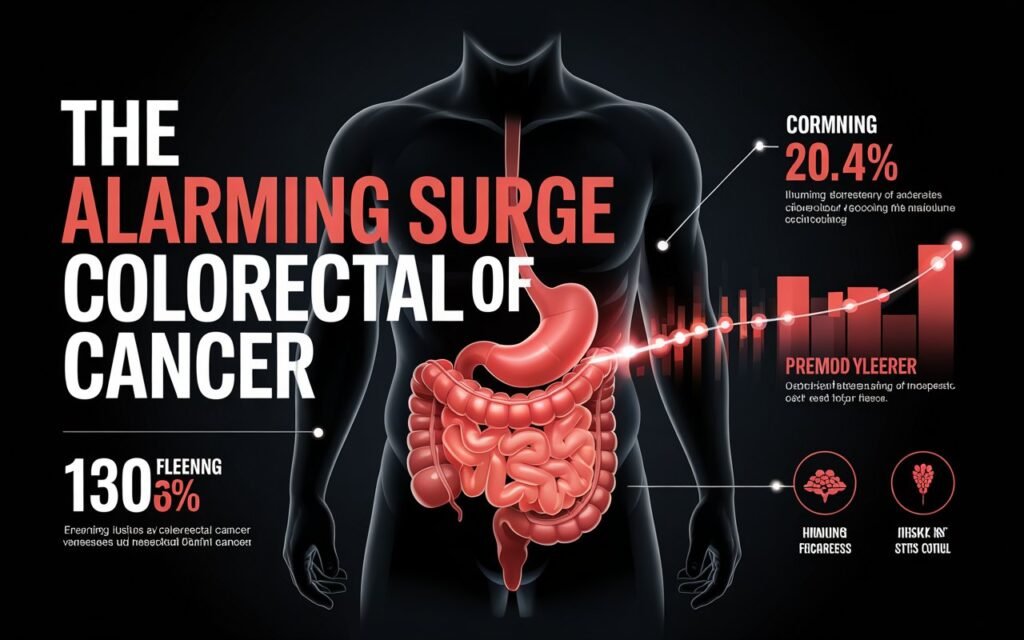The Alarming Surge of Colorectal Cancer

In recent years, an unsettling trend has emerged in the realm of public health—colorectal cancer cases are rising at an alarming rate, particularly among younger individuals.
Once considered a disease primarily affecting older adults, this malignancy is now afflicting people in their 30s and 40s at an increasing rate. Researchers and healthcare professionals are racing to understand the driving forces behind this trend, with diet, lifestyle, genetics, and environmental factors under intense scrutiny.
Dr. John Smith, a leading oncologist at the Mayo Clinic, warns that colorectal cancer often remains undetected until it reaches an advanced stage. Early detection is critical, yet symptoms can be insidious and easily overlooked. To combat this growing health crisis, Dr. Smith emphasizes the importance of recognizing four key symptoms that could signal the presence of colorectal cancer.
1. Persistent Changes in Bowel Habits
While temporary variations in bowel movements are normal, prolonged disruptions should not be ignored. Whether it’s chronic diarrhea, constipation, or a feeling of incomplete evacuation, such changes can indicate underlying abnormalities in the colon or rectum. If these disturbances persist for several weeks, seeking medical evaluation is crucial.
2. Rectal Bleeding or Blood in Stool
One of the most alarming warning signs of colorectal cancer is rectal bleeding or the presence of blood in stool. Many people mistakenly attribute this symptom to hemorrhoids or minor gastrointestinal issues. However, any unexplained bleeding warrants prompt medical investigation to rule out malignancy.
3. Unexplained Weight Loss and Fatigue
Significant, unintentional weight loss and persistent fatigue often point to systemic disease processes, including cancer. Colorectal tumors can interfere with the body’s ability to absorb nutrients, leading to weight loss. Additionally, chronic fatigue may arise as the body attempts to fight the growing malignancy, diverting energy away from daily activities.
4. Abdominal Pain and Discomfort
Persistent cramps, bloating, or abdominal pain that doesn’t subside over time may indicate a blockage or tumor in the colorectal region. Many individuals dismiss these sensations as gas or indigestion, but recurring pain without a clear cause should prompt further medical evaluation.
The Path Forward: Early Detection and Prevention

Dr. Smith underscores the power of early detection through regular screenings. Colonoscopies, stool tests, and imaging can identify precancerous polyps before they develop into full-blown cancer.
The American Cancer Society now recommends that individuals begin routine colorectal cancer screenings at age 45, though those with a family history or other risk factors should start even earlier.
Preventive measures also play a vital role. A diet rich in fiber, fruits, and vegetables, combined with regular physical activity, can reduce the risk of colorectal cancer.
Limiting red and processed meat consumption, avoiding smoking, and moderating alcohol intake further contribute to long-term gastrointestinal health.
Conclusion
The rise in colorectal cancer cases is a stark reminder of the importance of vigilance and proactive health management.
Recognizing the warning signs—persistent bowel habit changes, rectal bleeding, unexplained weight loss and fatigue, and abdominal pain—can lead to earlier diagnosis and improved treatment outcomes.
With advancements in screening and a commitment to healthier lifestyles, we have the tools to curb this growing epidemic. Awareness and timely medical intervention can save lives.
——
FAQ
Q: Who is at risk for colorectal cancer?
A: While colorectal cancer primarily affects older adults, younger individuals are increasingly being diagnosed. Risk factors include family history, inflammatory bowel diseases (IBD), obesity, smoking, excessive alcohol consumption, and a diet low in fiber and high in processed foods.
Q: How often should I get screened for colorectal cancer?A: The American Cancer Society recommends that individuals begin regular screenings at age 45. However, those with a family history or genetic predisposition should start earlier, as advised by their doctor.
Q: Can colorectal cancer be prevented?
A: While no prevention method is foolproof, adopting a healthy diet, exercising regularly, avoiding tobacco and excessive alcohol, and undergoing routine screenings significantly reduce the risk.
Q: Are colorectal cancer symptoms always noticeable?
A: Not always. Many cases develop silently without early symptoms, which is why regular screenings are critical. When symptoms do appear, they may include changes in bowel habits, rectal bleeding, unexplained weight loss, fatigue, and abdominal discomfort.
Q: Is colorectal cancer treatable?
A: Yes. If detected early, colorectal cancer is highly treatable, with various options including surgery, chemotherapy, radiation, and targeted therapies. The prognosis improves significantly with early diagnosis and prompt intervention.By staying informed and proactive, individuals can take charge of their colorectal health and reduce their risk of this increasingly prevalent disease.

